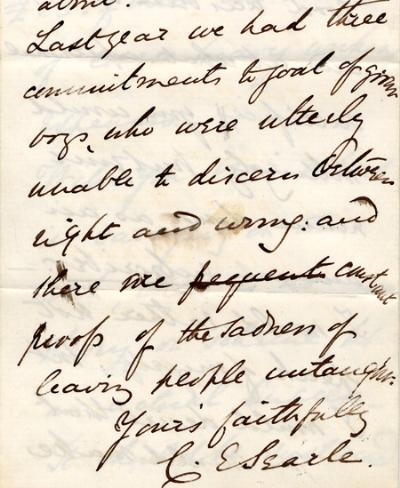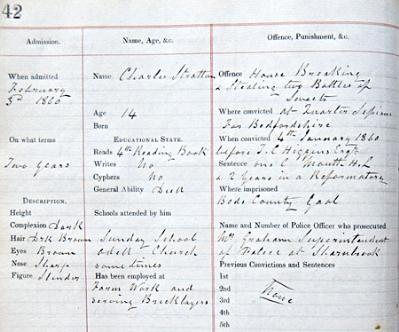Harrold Odell Paths to Crime Walk stop 8 High Street
93 High Street, Odell
Sweetmeats
Numbers 91 and 93 High Street were both commercial premises in the nineteenth century, 91 being the post office and 93 a shop and off licence. It is likely that the latter was the shop that was broken into on the night of 22 November 1859 by fifteen year old Ezra Foskett and fourteen year old Charles Stratton. Sarah York, wife of the shopkeeper William York had left five jars of sweetmeats standing in the pantry window, which opened onto the road. The window was fastened and she locked the house when she left. The next morning she found the window open, a pane of glass broken, and the sweetmeats gone. Mrs York suspected Foskett and Stratton and told the police of her suspicions. Later that week Stratton's mother came to her and asked if she would forgive the boys if they confessed and paid for the damage. The next day the boys themselves came and promised to pay eighteen pence each in a fortnight's time, but Mrs York was subsequently required to take proceedings against them. Foskett admitted to PC George Smith that they had broken open the window, taken the sweetmeats and divided them between themselves.
Odell appears to have had a problem with juvenile crime at this time. In a letter written by the Rector in 1860 appealing for support for a new village school he said:

"Last year we had three commitments to gaol of grown boys who were utterly unable to discern between right and wrong and there were constant proofs of the sadness of leaving people untaught".
Two of these "grown boys" must have been Ezra Foskett and Charles Stratton.
Foskett and Stratton were both sentenced to one month imprisonment with hard labour followed by two years in the Reformatory at Turvey.

This was opened in 1857 following the passing of the Reformatory School Act in 1854 in an attempt to prevent juvenile offenders being turned into hardened criminals by imprisonment in an adult gaol. Foskett and Stratton did not stay in the Reformatory however, and were sent on to the Cornwall Reformatory Ship. Other Bedfordshire boys were also sent to serve their sentence on board one of these reformatory ships. In 1871 Henry Tuck, a thirteen year old apprentice shoemaker, was convicted of stealing a coat, a hat, a scarf and a pair of shoes from his master and was sent to the Akbar for five years. This was the second of two reformatory ships of the same name which were moored off Liverpool from 1855 to 1907. Life on board the ships could be grim.
Life on board the Akbar was harsh and dangerous. Food was in short supply and not very healthy. In the summer ventilation was inadequate and in the winter temperatures on board were very low. This was particularly so in 1894 when parts of the River Mersey froze for around thirteen weeks. It is no surprise that many boys fell ill and that some died. In 1893 an inspector criticised the Akbar's health record and as a result the boys were evacuated to New Ferry Cholera Hospital on the Wirral while the ship was cleaned. Life on board any ship was by its very nature dangerous. The Akbar's minute books record a number of accidental deaths and injuries amongst its boys. ( E Chambré Hardman Archive ).
Whether it was due to similarly bad conditions on the Cornwall or simply to poor health or illness is not known, but Charles Stratton did not survive his incarceration. The admission register for the Reformatory records his death on the Cornwall in 1861.
Our Paths to Crime document of the month page Life on the Ocean Wave looks at the treatment of juvenile offenders in more detail.
References: QSR1860/1/5/3-4; QSR1872/1/5/5; BS599